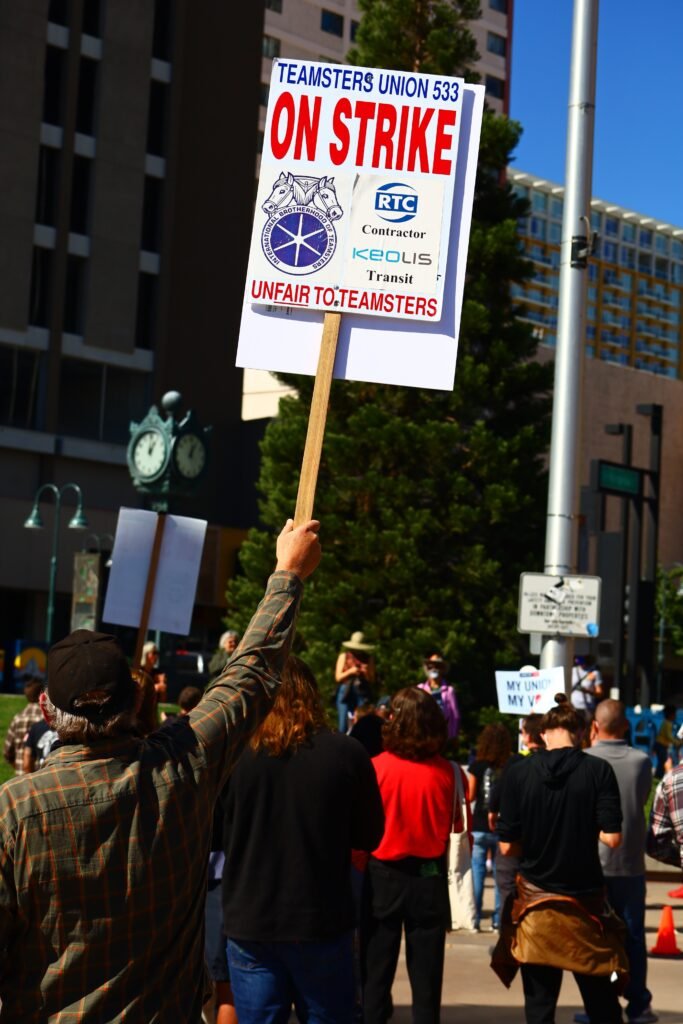Amidst an extraordinary year for labor organizing in the United States, approximately 75,000 healthcare workers at Kaiser Permanente have embarked on a three-day strike across multiple states. These workers are demanding higher wages and an end to understaffing, claiming that the lack of personnel is negatively impacting patient care. Kaiser Permanente, one of the nation’s leading healthcare insurers and system operators, operates 39 hospitals and provides health coverage for nearly 13 million individuals. The healthcare industry has seen a surge in worker activism this year, as burnout and heavy workloads continue to plague the sector. As a result of the strike, appointments may face delays, and nonurgent procedures may need to be rescheduled. Despite Kaiser Permanente’s claim that it has been bargaining in good faith, healthcare workers are determined to make their voices heard in order to prioritize their patients’ well-being.

Read more about the Latest Money News
Heading 1
75,000 Kaiser Permanente healthcare workers are on strike in multiple states
Some 75,000 healthcare workers employed by Kaiser Permanente, one of the largest insurers and healthcare system operators in the United States, have gone on strike in multiple states. The strike, organized by the Coalition of Kaiser Permanente Unions, is aimed at demanding higher wages and an end to understaffing. This major healthcare strike is taking place amidst a year of extraordinary labor organizing and work stoppages in the U.S.
Heading 2
Workers demanding higher wages and an end to understaffing
The primary demands of the striking workers are higher wages and an end to understaffing. The healthcare workers argue that understaffing has a detrimental impact on patient care, and they are calling for increased staffing levels to ensure quality care. Additionally, the workers are demanding higher wages as a reflection of their vital role in the healthcare industry and the increased costs of living.
Read more about the Latest Money News
Heading 3
Workers walking off the job in multiple states
The strike has seen healthcare workers across multiple states walking off the job. The Coalition of Kaiser Permanente Unions, which represents approximately 85,000 employees of the health system, has approved a three-day strike in California, Colorado, Oregon, and Washington State, and a one-day strike in Virginia and Washington, D.C. The strike has resulted in picketers outside Kaiser Permanente hospitals, and thousands of workers participating in the walkout.
Heading 3
Kaiser Permanente’s role as a healthcare system operator
Kaiser Permanente is a prominent healthcare system operator in the United States, with 39 hospitals nationwide. The nonprofit organization, based in Oakland, California, provides health coverage for nearly 13 million individuals. Kaiser Permanente operates a network of clinics and hospitals, providing comprehensive healthcare services to its members. As a major player in the healthcare industry, Kaiser Permanente’s operations have a significant impact on patient care and healthcare workers’ employment conditions.

Heading 3
The Coalition of Kaiser Permanente Unions organizing the strike
The strike is organized by the Coalition of Kaiser Permanente Unions, an alliance of labor unions that represent healthcare workers employed by Kaiser Permanente. The coalition represents approximately 85,000 employees of the health system across the United States. The coalition advocates for the rights and interests of healthcare workers, negotiating for fair wages, better working conditions, and improved patient care. The coalition’s decision to organize a strike reflects their commitment to addressing the concerns and demands of their members.
Heading 3
Types of healthcare workers participating in the strike
The strike has seen participation from various types of healthcare workers employed by Kaiser Permanente. These include licensed vocational nurses, home health aides, ultrasound sonographers, and technicians in radiology, X-ray, surgical, pharmacy, and emergency departments. While doctors are not participating in the strike, the participation of a wide range of healthcare professionals highlights the widespread concerns about working conditions and patient care within the healthcare system.

Heading 3
Impact of the strike on hospitals and patient care
The strike by 75,000 Kaiser Permanente healthcare workers has significant implications for hospitals and patient care. While Kaiser Permanente has stated that its hospitals, including emergency rooms, will remain open during the strike, the influx of temporary workers may result in delays in appointments and the rescheduling of non-urgent procedures. With reduced staffing levels, hospitals may face challenges in providing the same level of care to patients, potentially leading to longer wait times and increased pressure on the remaining healthcare workers.
Heading 3
Significance of the strike in the larger context of labor organizing in the U.S.
The Kaiser Permanente healthcare workers’ strike holds significant significance in the broader context of labor organizing in the United States. This strike is part of a larger trend of increased worker organizing and work stoppages across various industries, including transportation, entertainment, and hospitality. The strike highlights the growing frustration among workers regarding issues such as low wages, understaffing, and poor working conditions. It also showcases the increasing willingness of workers to take collective action to demand fair treatment and improved working conditions.
Heading 3
Challenges faced by the healthcare industry, including burnout and understaffing
The strike by Kaiser Permanente healthcare workers sheds light on the challenges faced by the healthcare industry as a whole. Burnout and understaffing have become significant issues within the industry, especially exacerbated by the COVID-19 pandemic. Healthcare professionals often face heavy workloads and long hours, resulting in physical and emotional exhaustion. Additionally, understaffing places additional strain on existing healthcare workers, impacting patient care and overall job satisfaction. The strike serves as a reminder of the urgent need to address these challenges within the healthcare industry.
Heading 3
Proposed legislation to increase minimum wage for healthcare workers
Amidst the strike, proposed legislation aims to address the concerns of healthcare workers regarding wages. The California legislature has sent a bill to Democratic Governor Gavin Newsom that would increase the minimum wage for the state’s 455,000 healthcare workers to $25 per hour over the next decade. This legislation recognizes the importance of fair compensation for healthcare workers and acknowledges the increasing cost of living. The bill’s outcome will have implications not only for Kaiser Permanente employees but for healthcare workers across California.









